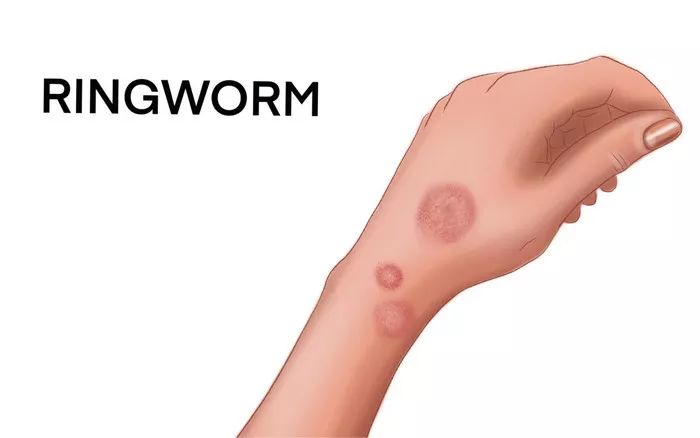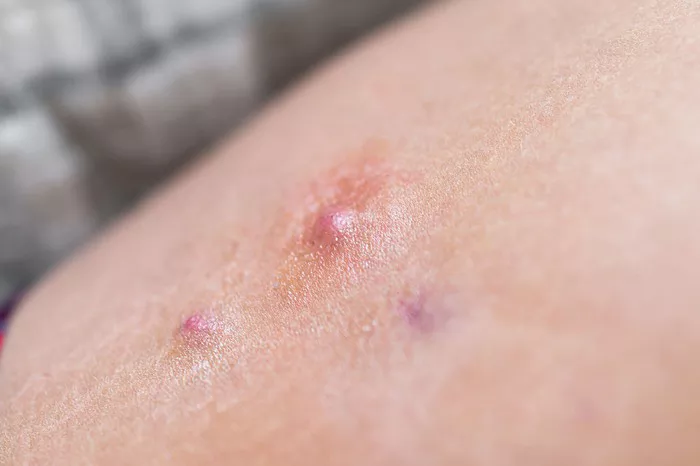Ringworm is a common fungal infection that can affect different parts of the body. Despite its name, it’s not caused by worms but by a type of fungus called dermatophytes. It’s known for creating a ring-like rash, which is why it’s called “ringworm.” One of the most common questions people ask when they notice symptoms of ringworm is whether ringworm itches or burns. Understanding these sensations can help identify the condition and seek treatment more effectively.
In this article, we’ll explore the symptoms of ringworm, particularly the sensations of itching and burning, and how they can differ depending on various factors such as location and severity of the infection.
What is Ringworm?
Ringworm, or dermatophytosis, is a skin infection caused by fungi that live on dead skin, hair, and nails. The infection can affect anyone, and it’s highly contagious. It’s spread through direct skin-to-skin contact, contaminated objects, or by coming into contact with animals that are infected.
Despite its name, ringworm doesn’t involve any worms. It gets its name from the appearance of the rash, which often looks like a red, itchy ring or a circular patch with raised edges. Ringworm can occur anywhere on the body, including the scalp, feet (commonly known as athlete’s foot), groin area (known as jock itch), and nails.
The main symptoms of ringworm include redness, peeling, itching, and a ring-shaped rash. The rash is often scaly, and it may start as a small red spot that gradually expands in size.
Does Ringworm Itch?
Yes, one of the most common symptoms of ringworm is itching. The infection causes irritation of the skin, leading to an uncomfortable and often persistent itch. The intensity of the itching can vary depending on several factors, such as the severity of the infection and the location of the rash.
When the body is fighting off the infection, the immune system releases certain chemicals, including histamine. Histamine is responsible for causing the itching sensation. In addition, the fungal infection itself irritates the skin, making it more likely to itch.
In some cases, the itch may be mild and manageable, while in others, it can be severe, especially if the infection is extensive or untreated. Scratching the affected area may make the itching worse and lead to further irritation or infection. It is important to avoid scratching as it can spread the infection to other parts of the body or to other people.
Does Ringworm Burn?
While itching is a common symptom, burning is less frequently associated with ringworm. However, in some cases, a person with ringworm might experience a burning sensation, especially if the infection is more severe or if there are complications. The burning sensation can be more noticeable in areas where the skin is thinner, such as the groin or between the fingers.
The burning sensation occurs when the fungus causes inflammation or if there is a secondary infection. The skin may become red, inflamed, or even blistered in some cases. If you experience both itching and burning, it could be a sign that the infection is spreading or becoming more intense.
Sometimes, ringworm may lead to an additional bacterial infection, particularly if the skin has been broken due to scratching. In such cases, the skin may burn and feel painful in addition to itching.
Where Does Ringworm Appear?
Ringworm can appear anywhere on the body, and its appearance may differ slightly depending on the area affected. The location of the infection can influence whether it itches, burns, or causes other symptoms.
Scalp (Tinea Capitis)
Ringworm on the scalp, known as tinea capitis, often causes itching, redness, and hair loss. In some cases, the scalp can feel sore and may even burn, especially if the infection is left untreated. The burning sensation is more common if the infection has caused an inflammatory response or if there is a secondary bacterial infection.
Body (Tinea Corporis)
Ringworm on the body, or tinea corporis, often appears as a red, circular rash with raised, scaly edges. It tends to be very itchy, especially around the edges of the ring. In some cases, the rash may burn, particularly if the skin is irritated or inflamed. Scratching the area can make both the itching and burning worse.
Feet (Athlete’s Foot)
Ringworm of the feet, known as athlete’s foot, causes itching, redness, and sometimes a burning sensation. The feet may also become cracked or blistered. The burning feeling is often more noticeable between the toes or on the soles of the feet.
Groin (Jock Itch)
Ringworm in the groin area, known as jock itch or tinea cruris, can be intensely itchy and sometimes painful. The skin in the groin is sensitive, and as the fungus spreads, it can lead to a burning sensation. The rash usually appears as a red ring or patch with a scaly, raised border.
Nails (Tinea Unguium)
Ringworm can also affect the nails, causing them to become thickened, discolored, and brittle. While itching is less common in nail ringworm, the nails may be painful and feel sensitive to the touch. Burning may also occur if there is an infection underneath the nail.
Factors That Affect Itching and Burning
The sensation of itching or burning can be influenced by several factors. These include:
1. Severity of the Infection
Mild ringworm infections might cause minimal itching, while more severe infections can lead to intense itching and even burning. The larger the affected area, the more likely the itching will be noticeable. Severe infections might also have more redness, swelling, and other symptoms, leading to a higher chance of a burning sensation.
2. Location of the Infection
As mentioned, the location of the infection can affect the sensation you feel. For example, infections on the scalp or groin may be more likely to cause burning due to the sensitivity of the skin in these areas.
3. Secondary Infections
If the affected area is scratched or damaged, bacteria can enter the skin, leading to a secondary infection. This can cause more pain, burning, and inflammation. Secondary infections may require additional treatment, such as antibiotics, to resolve.
4. Skin Sensitivity
Some people have more sensitive skin than others. If you have sensitive skin or are prone to allergic reactions, you may experience more itching or burning with ringworm. Additionally, if the skin is already irritated, such as from excessive sweating, the infection may feel more uncomfortable.
5. Moisture and Heat
Fungi thrive in warm, damp environments. If the affected area is kept moist and warm (for example, in the groin or between the toes), the infection might cause more itching and burning. Keeping the area dry and clean can help reduce the discomfort.
When Should You See a Doctor?
Most cases of ringworm can be treated effectively with antifungal creams or medications. However, it is important to seek medical attention if:
- The itching or burning becomes severe or unmanageable.
- The infection spreads rapidly or covers a large area of the body.
- There are signs of secondary bacterial infection, such as increased redness, swelling, pus, or a fever.
- Over-the-counter antifungal treatments do not improve the symptoms after a week or two.
- The infection occurs on the scalp or nails, which may require prescription-strength antifungal treatment.
Treatment for Ringworm
Ringworm is typically treated with antifungal medications. These can come in the form of creams, powders, sprays, or oral medications, depending on the location and severity of the infection.
1. Topical Treatments
For mild cases, over-the-counter antifungal creams like clotrimazole, miconazole, or terbinafine can help. These creams are usually applied directly to the affected area and are effective in reducing symptoms like itching and burning.
2. Oral Antifungals
If the infection is widespread or affects the scalp or nails, a doctor may prescribe oral antifungal medications, such as terbinafine or itraconazole. These medications help treat more severe or persistent infections.
3. Home Remedies
In addition to antifungal treatments, some home remedies may help relieve itching and burning. These include:
- Keeping the skin clean and dry to prevent the fungus from thriving.
- Using anti-itch creams containing hydrocortisone to reduce itching.
- Applying aloe vera gel or coconut oil, which can soothe the skin and reduce irritation.
Conclusion
Ringworm is an uncomfortable fungal infection that can cause a range of symptoms, including itching and sometimes burning. The severity and location of the infection can influence how much itches or burns. While itching is more common, some people may experience a burning sensation, particularly if the infection is severe or complicated by a secondary infection.
If you suspect you have ringworm, it’s important to seek treatment promptly to avoid the infection spreading and to reduce discomfort. With the right treatment, most cases of ringworm can be resolved quickly.
Related topics



























